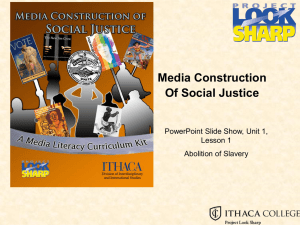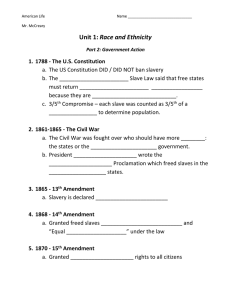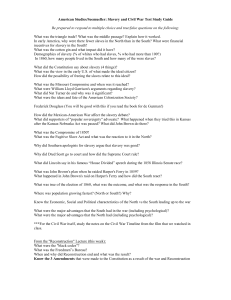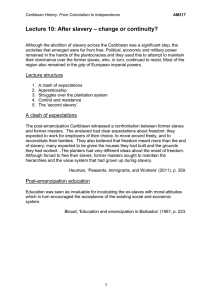Phases of African-American History (put these in order)
advertisement
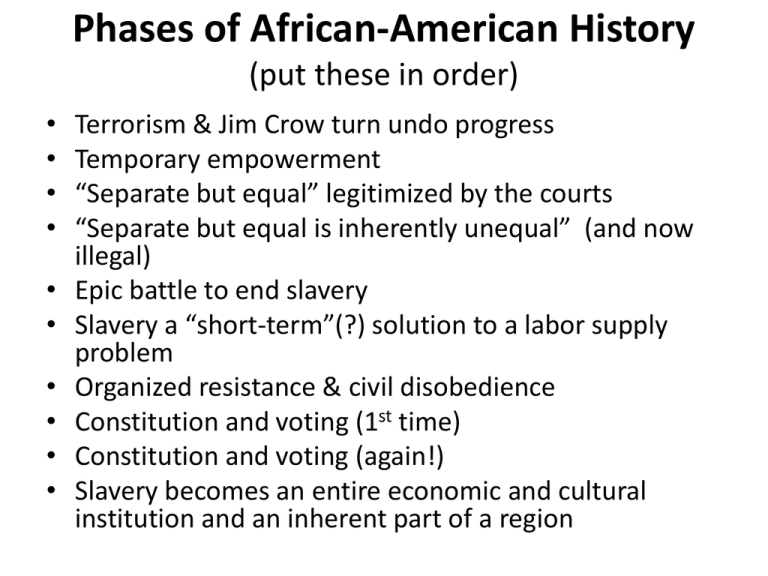
Phases of African-American History (put these in order) • • • • • • • • • • Terrorism & Jim Crow turn undo progress Temporary empowerment “Separate but equal” legitimized by the courts “Separate but equal is inherently unequal” (and now illegal) Epic battle to end slavery Slavery a “short-term”(?) solution to a labor supply problem Organized resistance & civil disobedience Constitution and voting (1st time) Constitution and voting (again!) Slavery becomes an entire economic and cultural institution and an inherent part of a region Phases of African-American History (put these in order) 1. Slavery a “short-term”(?) solution to a labor supply problem 2. Slavery becomes an entire economic and cultural institution and an inherent part of a region 3. Epic battle to end slavery 4. Constitution and voting (1st time) 5. Temporary empowerment 6. Terrorism & Jim Crow turn undo progress 7. “Separate but equal is inherently unequal” (and now illegal) 8. “Separate but equal” legitimized by the courts 9. Organized resistance & civil disobedience 10. Constitution and voting (again!) Black Americans - Slavery • Indentured servitude, plantation economics & Bacon’s Rebellion • Triangle trade (slaves, molasses, rum) • Slow growth in slave population in early 1600s • 1680s slaves outnumber whites in planation economies • By 1720s, slave pop is self perpetuating • Northwest Ordinance of 1787 prohibits slavery in new territories • Missouri Compromise (1820) • Cotton Gin & cotton economy • Freedmen • Slaves vs wage slaves • Dred Scott Decision • Reconstruction –(13th, 14th, 15th Amendments) Black Americans • Reconstruction – new subjugation (KKK, black codes, sharecropping) • Migrations to northern cities • KKK in the 1920s • W.E.B. Dubois & NAACP • Booker T. Washington • A. Philip Randolph • C.O.R.E., SCLC, SNCC • • • • • • • • • Executive Order 8802 Executive Order 9981 Brown vs Board (1954) Montgomery Bus Boycott (1955-1956) 24th Amend (1964) – Poll Tax March on D.C. (1963) Civil Rights Act (1964) Voting Rights Act (1965) Urban Riots Native Americans • Highly advanced civilizations in Central America • Advanced, but less complex civilizations in North America • Hunter-gather & simple agriculture not strong enough or organized enough to resist European encroachment • English – evacuate (removal from land) • French – negotiate (trade) • Spanish – subjugate & integrate (take over & intermarry) Native Americans • Pequot War (1637, CT) • Pontiac’s Rebellion • G. Washington recognized tribes as separate nations & would negotiate by treaties • Tecumseh (1813) • Assimilation & Christianizing • Georgia, Jackson & the Cherokee (1828) • 1830 Indian Removal Act • Indians defeated in wars east of Miss. R. (1832-1837) • Trail of Tears (1838-1839) • Dawes Severalty Act (1887) • Indian Reorganization Act (1934) • Wounded Knee (1890) • Eisenhower & push to the cities; Public Law 280 & efforts to terminate tribal recognition • Alcatraz (1969-1971)& Wounded Knee (1973) Women • Crucial to early New • New Jersey prohibits England success (early property owning women marriage & booming from suffrage (1807) birthrate) • “Republican Motherhood” • S. women more (civic virtue, moral powerful b/c more instruction) increased scarce (but all better off women’s educational than women in opportunities England) • Lowell Girls (1840s) Women • Lucretia Mott, Elizabeth Cady Stanton, & Susan B. Anthony • Seneca Falls & Declaration of Sentiments • Dr. Elizabeth Blackwell • Margaret Fuller (transcendentalist journalist) • Sarah & Angelina Grimke (abolition) • Temperance & abolition Women • Growth of big cities and independent young women; “New Women” vs. “Gibson Girls” • Progressivism, temperance & early political empowerment on the social level • 19th Amendment (1920) • 1920s: flappers, sexual liberation • • • • Rosie the Riveter Cult of Domesticity Women’s Liberation Inclusion Title VII of the Civil Rights Act (“accidental” progress) • Unsuccessful effort to pass an Equal Rights Amendment
